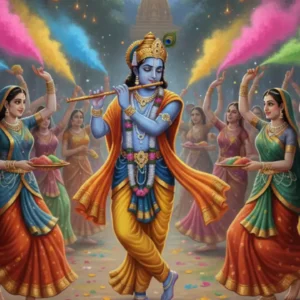Shravan, often referred to as “Sawan,” is a significant month in the Hindu lunar calendar. This sacred period usually falls between July and August, marking the arrival of the monsoon season in India. Hindus across the country observe various rituals and practices during this month, seeking spiritual renewal, divine blessings, and the grace of Lord Shiva. Let’s delve into the essence of the month of divine Shravan and explore the profound significance it holds in the realm of Hindu spirituality.
Embracing Spiritual Austerity: A Month of Fasting and Devotion
Shravan is synonymous with devotion and austerity. Devotees engage in fasting, prayer, and meditation, aiming to purify their minds, bodies, and souls. Fasting on Mondays, known as “Shravan Somvar,” is particularly observed to honor Lord Shiva. The practice involves consuming only fruits, milk, and specific vrat (fasting) food, fostering self-discipline and detachment from worldly desires.
Worshiping the Lingam: Seeking Lord Shiva’s Blessings
Central to Shravan’s observances is the veneration of Lord Shiva. Devotees visit Shiva temples, offering sacred bilva leaves, milk, and water to the Shiva Lingam. These offerings symbolize devotion, purity, and the cyclical nature of life. The rhythmic chants of “Om Namah Shivaya” reverberate through temples, resonating with the deep spiritual yearning of the devotees.
The Significance of Water: Abhishek and Holy Journeys
Water holds a special place in Shravan rituals. Devotees perform “abhishek” by pouring water, milk, and other substances over the Shiva Lingam, representing the purification of the soul. Moreover, the holy rivers of India, such as the Ganga, witness a surge of pilgrims during this month. Collecting Ganga water and carrying it back home is believed to cleanse one’s sins and bring prosperity.
Connecting with Nature: Monsoon and Divine Romance
Shravan coincides with the monsoon season, a time of rejuvenation for nature. The pouring rains are seen as a metaphor for the tears of separation between Lord Shiva and Goddess Parvati. The story of their divine romance, coupled with the natural beauty of the season, adds a touch of mystical allure to the month, inspiring devotees to deepen their spiritual connection.
Observing Vrat and Upvaas: Fasting as a Path to Enlightenment
Fasting during Shravan is not merely a physical act; it’s a profound spiritual practice. Devotees abstain from certain foods, refraining from indulgence and practicing self-control. The intention is to cleanse the mind, cultivate inner strength, and attain spiritual enlightenment. The disciplined lifestyle embraced during this month serves as a reminder of the impermanence of material desires.
ALSO READ:
Om Namah Shivaya: Chanting For Divine Harmony
Om Mantra: Unlocking the Power of Sacred Sound
Mahamrityunjaya Mantra: Chant of Immortality
Cultural Diversity, Spiritual Unity: Divine Shravan Across India
While Shravan is predominantly associated with Lord Shiva, different regions of India celebrate this month with unique traditions. In North India, the “Kanwar Yatra” witnesses thousands of devotees carrying holy water from the Ganges to their local Shiva temples. In Maharashtra, “Naga Panchami” is observed, where serpents are worshipped. Despite these variations, the underlying theme of seeking spiritual renewal remains constant.
Divine Shravan: A Time for Family and Community: Strengthening Bonds Through Rituals
Shravan brings families and communities together through shared rituals and festivities. From participating in group prayers to exchanging sweets and gifts, the month fosters a sense of unity and belonging. Elders pass down the significance of Shravan to younger generations, ensuring the preservation of cultural and spiritual values.
The Power of Mantras during Divine Shravan: Chanting for Inner Transformation
Chanting sacred mantras is an integral part of Shravan practices. The vibrations of these mantras resonate deeply within, leading to inner transformation. Mantras like “Om Namah Shivaya” and “Maha Mrityunjaya Mantra” hold immense spiritual potency, helping devotees overcome obstacles, conquer fear, and find solace.
Conclusion: Renewal of the Spirit and Connection with the Divine
Shravan, the auspicious month of spiritual renewal, offers devotees an opportunity to connect with the divine through a range of practices and rituals. Whether it’s fasting, visiting temples, chanting mantras, or embracing the beauty of nature, Shravan’s essence lies in seeking purity, self-discipline, and spiritual growth. As the rains wash away the impurities of the earth, so does the month of divine Shravan cleanse the hearts and minds of those who wholeheartedly engage in its observances.





